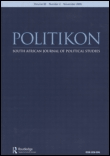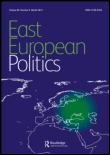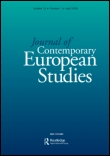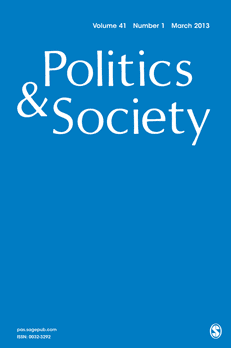
Intersections-East European Journal of Society and Politics
Scope & Guideline
Innovative Insights into the Heart of Eastern European Politics
Introduction
Aims and Scopes
- Political Dynamics and Governance:
The journal emphasizes the analysis of political structures, governance, and the evolving nature of democracy in Eastern Europe, particularly focusing on the impacts of populism, authoritarianism, and the rule of law. - Migration and Social Integration:
Research on migration trends, integration challenges, and the experiences of displaced populations is a core area, exploring how these dynamics affect social cohesion within various Eastern European contexts. - Cultural Studies and Identity Politics:
The journal addresses cultural narratives, identity formation, and the role of civil society in shaping public discourse, particularly in relation to ethnic, gender, and minority issues. - Interdisciplinary Approaches to Social Issues:
It encourages interdisciplinary methodologies, combining qualitative and quantitative research to provide comprehensive insights into social justice, rights, and ethical considerations in policy-making. - Historical Contextualization:
Understanding current phenomena through historical lenses is crucial, where the journal reflects on past socio-political movements and their legacies in today’s society.
Trending and Emerging
- Populism and Authoritarianism:
A significant increase in studies examining the rise of populist movements and authoritarian governance in Eastern Europe highlights the urgency of understanding these political phenomena. - Migration and Refugee Studies:
The focus on migration, particularly regarding asylum seekers and integration challenges, has surged, reflecting ongoing global crises and the need for comprehensive sociopolitical responses. - Digital Society and Technology:
Research exploring the implications of digital technology on society, including issues of privacy, communication, and social interaction, is emerging as a critical area of inquiry. - Identity Politics and Intersectionality:
There is a growing trend towards exploring intersectional identities and their implications for social justice, emphasizing the complexities of race, ethnicity, and gender in political contexts. - Crisis Responses and Resilience:
Studies focusing on societal responses to crises, such as the COVID-19 pandemic, are increasingly prevalent, showcasing how communities adapt and resist under challenging circumstances.
Declining or Waning
- Traditional Economic Perspectives:
There has been a noticeable decline in research focusing on traditional economic analyses and models, indicating a shift towards more sociocultural and political dimensions of issues. - Static Gender Studies:
While gender studies remain relevant, the journal has seen fewer contributions that focus solely on static gender roles, with a trend towards more dynamic intersections of gender with other social identities. - Longitudinal Studies on Post-Socialism:
There is a decrease in longitudinal studies that specifically track post-socialist transitions, suggesting a pivot to more immediate socio-political analyses rather than extended historical frameworks. - Local vs. Global Dynamics:
Research focusing solely on local dynamics without considering global influences is becoming less frequent, reflecting a broader recognition of the interconnectedness of local and global issues. - Environmental Politics in Eastern Europe:
Despite its importance, studies specifically addressing environmental politics are becoming less common, indicating a potential gap in addressing ecological challenges within the socio-political discourse.
Similar Journals

Politikon
Illuminating Contemporary Issues in Politics and SocietyPolitikon is a prestigious journal published by Routledge Journals, Taylor & Francis Ltd, focusing on the dynamic fields of Political Science and International Relations as well as Sociology. With an impressive history dating back to 1974, the journal has established itself as a significant contributor to scholarly discourse, reflected in its 2023 categorization within Q2 quartiles in both the Political Science and International Relations category and the Sociology and Political Science category. Although Open Access options are not currently available, Politikon provides valuable insights and rigorous research that are instrumental for academics, practitioners, and students alike. The journal has also achieved notable Scopus rankings, showcasing its relevance in the social sciences arena. By exploring contemporary political issues and sociopolitical phenomena, Politikon continues to be a vital resource for those seeking to understand the complexities of governance, policy-making, and societal dynamics on a global scale.

Annee du Maghreb
Advancing Knowledge of North African NarrativesAnnée du Maghreb, published by CNRS Éditions, is an esteemed open-access journal dedicated to advancing the study of Mediterranean and North African cultures, history, and societies. Since its inception in 2004, the journal has aimed to foster a deeper understanding of the complex socio-political dynamics, artistic expressions, and historical contexts of the Maghreb region. By providing a platform for rigorous research and interdisciplinary dialogue, Année du Maghreb plays a pivotal role in enriching academic discourse and enhancing knowledge within the fields of anthropology, history, and cultural studies. Accessible to a global audience, this journal invites researchers, professionals, and students to contribute to its growing repository of scholarly work, ensuring the continuation of high-quality discussions pertinent to this vibrant area of study.

LATIN AMERICAN POLITICS AND SOCIETY
Fostering Scholarly Discourse on Political EvolutionLatin American Politics and Society, published by Cambridge University Press, is a leading academic journal dedicated to the interdisciplinary study of political and social dynamics in Latin America. With an impressive impact factor and distinguished rankings in several categories—specifically Q1 in Geography, Planning and Development; Political Science and International Relations; and Sociology and Political Science—this journal serves as a crucial resource for scholars and practitioners in these fields. With ISSN 1531-426X and E-ISSN 1548-2456, it provides a platform for innovative research that reflects the complexity of Latin American societies. This journal not only fosters scholarly discourse but also ensures broad accessibility through its open access options, making cutting-edge research available to a wider audience. Engaging with topics from governance, policy analysis, and community studies to social movements, Latin American Politics and Society is essential for those seeking to understand the socio-political landscape of this pivotal region from 2001 to 2024 and beyond.

East European Politics
Advancing Knowledge on Socio-Political ChallengesEast European Politics, published by ROUTLEDGE JOURNALS, TAYLOR & FRANCIS LTD, is a premier academic journal that plays a pivotal role in advancing the understanding of the socio-political dynamics within East Europe. Established in 2012 and spanning through 2024, this journal is renowned for its rigorous scholarship, achieving a distinguished Q1 ranking in key categories including Development, Geography, Planning and Development, and Political Science and International Relations for 2023. With an impressive Scopus rank placing it in the top 5% within the fields of Political Science and International Relations, East European Politics serves as an essential resource for researchers, professionals, and students seeking to engage with contemporary political issues and development challenges in the region. The journal does not offer open access at this time, but maintains a rich archive of high-quality articles that contribute significantly to scholarly discourse and policy analysis. This vital platform not only disseminates current research but also fosters a deeper understanding of the historical and cultural contexts that shape the political landscapes of East Europe.

Politix
Engaging Minds in the Heart of Sociopolitical ResearchPolitix is a leading academic journal published by DE BOECK UNIV, specializing in the fields of sociology and political science. With its ISSN 0295-2319 and E-ISSN 1953-8286, this journal serves as a critical platform for researchers and professionals to disseminate their findings and engage in discourse relevant to contemporary societal issues. Encompassing a wide array of topics that intersect the realms of politics and society, Politix aims to foster research that not only enriches academic knowledge but also informs public policy and practices. Although currently positioned in the Q4 quartile as per the 2023 category rankings, it is an essential resource for understanding the dynamics of social and political interactions. Regularly publishing research articles, reviews, and theoretical discussions, Politix contributes to the scholarly community's understanding of pressing social challenges. Located in France with an address in Belgium, the journal reflects a European perspective while welcoming contributions from global scholars. Researchers, professionals, and students are encouraged to engage with its content, share insights, and contribute to the ongoing conversation surrounding sociopolitical phenomena.

Comparative Southeast European Studies
Advancing Knowledge through Comparative Perspectives on Southeast EuropeComparative Southeast European Studies, published by WALTER DE GRUYTER GMBH, is an esteemed open-access journal that has been contributing to scholarly discourse since its inception in 2021. With its ISSN 2701-8199 and E-ISSN 2701-8202, the journal is dedicated to the multidisciplinary examination of Southeast European societies, cultures, and economies. The journal strives to foster a nuanced understanding of historical and contemporary issues through an array of perspectives, appealing to researchers, professionals, and students alike. While it currently resides in Q4 for several categories including Anthropology, Economics, and Political Science, it maintains a robust platform for innovative research and dialogue within the region. Situated in Germany, this journal serves not only as a repository of knowledge but also as a catalyst for future scholarly endeavors, with the aim to elevate the discourse surrounding Southeast Europe during the converging years of 2021 to 2024. Its commitment to open access ensures that critical research is readily available, inspiring collaboration and engagement across academic and professional communities.

Journal of Contemporary European Studies
Advancing Insight into Europe's Cultural and Political LandscapeJournal of Contemporary European Studies, published by Routledge Journals, Taylor & Francis Ltd, stands as a pivotal resource in the fields of Cultural Studies, Political Science, and Sociology. With a distinguished Q1 ranking in Cultural Studies and prominent positions in Political Science and International Relations, this journal is committed to exploring the complexities of European society through a contemporary lens. The journal caters to researchers, professionals, and students interested in understanding the socio-political dynamics within Europe from 2007 to 2024 and beyond. Although it operates on a standard subscription basis, the journal ensures that its high-quality research and insightful articles are accessible to its audience. With impressive rankings in Scopus, boasting a 91st percentile in Cultural Studies, the journal not only contributes significantly to academic discourse but also fosters a deeper understanding of Europe's evolving cultural and political landscape.

POLITICS & SOCIETY
Exploring the intricate dynamics of political and social landscapes.POLITICS & SOCIETY is a premier journal published by SAGE Publications Inc, dedicated to advancing scholarly discourse in the fields of political science, sociology, and international relations. Established in the early 1970s, it has garnered a strong reputation, reflected in its esteemed Q1 rankings across multiple categories, including Political Science and International Relations, as well as Sociology. With a significant emphasis on interdisciplinary approaches, the journal publishes innovative research that explores the complex interplay of politics and societal dynamics globally. Researchers aiming to publish high-quality articles will appreciate the journal's rigorous peer-review process and its commitment to theoretical and empirical excellence. Although not an open-access journal, it ensures wide accessibility through various institutional subscriptions. As the landscape of political and social studies evolves, POLITICS & SOCIETY remains at the forefront, making vital contributions to our understanding of the pressing issues that shape contemporary society.

OSTEUROPA
Fostering Dialogue on Eastern European DevelopmentsOSTEUROPA is a distinguished academic journal dedicated to the examination and analysis of social, cultural, and political developments in Eastern Europe. Published by BWV-BERLINER WISSENSCHAFTS-VERLAG GMBH, this journal has been a critical voice in the field since its inception in the mid-20th century, notably converging from various years to establish a comprehensive discourse on the dynamics shaping the region. With an ISSN of 0030-6428 and an E-ISSN of 2509-3444, OSTEUROPA taps into the expansive fields of sociology and political science, holding a reputable Q3 category ranking in these disciplines for 2023. While not currently an open access publication, it remains a vital platform for researchers, professionals, and students alike who seek to deepen their understanding of Eastern European affairs. The journal also ranks in the 17th percentile within the Scopus listings, underscoring its role as a significant, albeit niche, contributor to social studies and political science scholarship. Addressed from its base in vibrant Berlin, OSTEUROPA continues to foster intellectual dialogue and provide valuable insights into the complexities of Eastern European societies.

International Journal of Politics Culture and Society
Engaging Minds in the Study of Politics and CultureThe International Journal of Politics Culture and Society, published by SPRINGER, serves as a premier platform for scholarly dialogue across the fields of political science, sociology, and cultural studies. With an ISSN of 0891-4486 and an E-ISSN of 1573-3416, this journal has successfully published rigorous research since its inception in 1987. It features a convergence of critical ideas and empirical studies that explore the intersection of political, cultural, and social dynamics globally. Ranked in the Q2 category for both Political Science and International Relations and Sociology by prestigious metrics, this journal reflects its high impact within the academic community, showcasing articles that hold significant relevance across disciplines. Additionally, it maintains commendable Scopus rankings, placing it in the 76th and 71st percentiles within its respective categories. While this journal operates under a subscription model, it remains committed to facilitating access to important research for professionals, researchers, and students eager to engage with contemporary political and social issues.